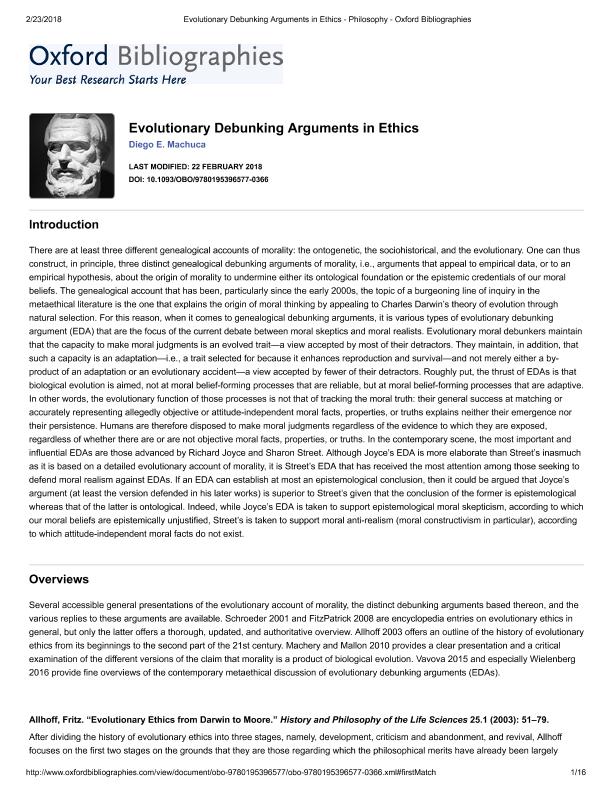Artículo
Evolutionary Debunking Arguments in Ethics
Fecha de publicación:
02/2018
Editorial:
Oxford University Press
Revista:
Oxford Bibliographies in Philosophy
ISSN:
0268-1137
Idioma:
Inglés
Tipo de recurso:
Artículo publicado
Clasificación temática:
Resumen
There are at least three different genealogical accounts of morality: the ontogenetic, the sociohistorical, and the evolutionary. One can thus construct, in principle, three distinct genealogical debunking arguments of morality, i.e., arguments that appeal to empirical data, or to an empirical hypothesis, about the origin of morality to undermine either its ontological foundation or the epistemic credentials of our moral beliefs. The genealogical account that has been, particularly since the early 2000s, the topic of a burgeoning line of inquiry in the metaethical literature is the one that explains the origin of moral thinking by appealing to Charles Darwin’s theory of evolution through natural selection. For this reason, when it comes to genealogical debunking arguments, it is various types of evolutionary debunking argument (EDA) that are the focus of the current debate between moral skeptics and moral realists. Evolutionary moral debunkers maintain that the capacity to make moral judgments is an evolved trait—a view accepted by most of their detractors. They maintain, in addition, that such a capacity is an adaptation—i.e., a trait selected for because it enhances reproduction and survival—and not merely either a by-product of an adaptation or an evolutionary accident—a view accepted by fewer of their detractors. Roughly put, the thrust of EDAs is that biological evolution is aimed, not at moral belief-forming processes that are reliable, but at moral belief-forming processes that are adaptive. In other words, the evolutionary function of those processes is not that of tracking the moral truth: their general success at matching or accurately representing allegedly objective or attitude-independent moral facts, properties, or truths explains neither their emergence nor their persistence. Humans are therefore disposed to make moral judgments regardless of the evidence to which they are exposed, regardless of whether there are or are not objective moral facts, properties, or truths. In the contemporary scene, the most important and influential EDAs are those advanced by Richard Joyce and Sharon Street. Although Joyce’s EDA is more elaborate than Street’s inasmuch as it is based on a detailed evolutionary account of morality, it is Street’s EDA that has received the most attention among those seeking to defend moral realism against EDAs. If an EDA can establish at most an epistemological conclusion, then it could be argued that Joyce’s argument (at least the version defended in his later works) is superior to Street’s given that the conclusion of the former is epistemological whereas that of the latter is ontological. Indeed, while Joyce’s EDA is taken to support epistemological moral skepticism, according to which our moral beliefs are epistemically unjustified, Street’s is taken to support moral anti-realism (moral constructivism in particular), according to which attitude-independent moral facts do not exist.
Palabras clave:
MORALITY
,
EVOLUTION
,
DEBUNKING
Archivos asociados
Licencia
Identificadores
Colecciones
Articulos(SEDE CENTRAL)
Articulos de SEDE CENTRAL
Articulos de SEDE CENTRAL
Citación
Machuca, Diego Emanuel; Evolutionary Debunking Arguments in Ethics; Oxford University Press; Oxford Bibliographies in Philosophy; 2-2018; 1-16
Compartir
Altmétricas




